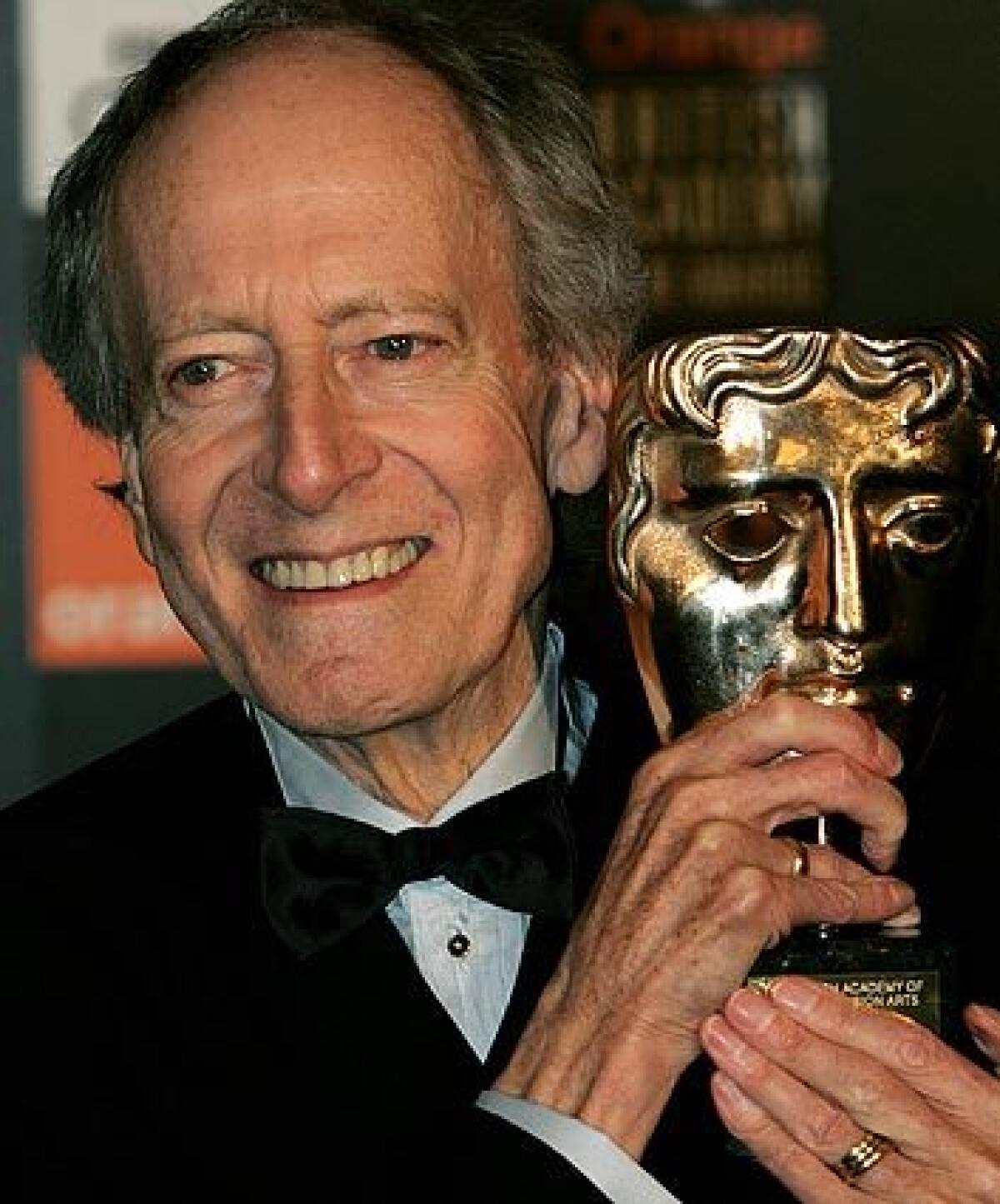John Barry dies at 77; composer scored 11 James Bond films

John Barry, a five-time Academy Award-winning composer of movies such as “Born Free” and “Out of Africa” who earned a prominent spot in pop-culture history by writing the scores for 11 James Bond films, including “From Russia With Love” and “Goldfinger,” has died. He was 77.
FOR THE RECORD:
John Barry: On the cover of the Feb. 1 LATExtra section, the obituary of Academy Award-winning composer John Barry incorrectly included a photo of editor Neil Travis, a fellow Oscar winner. Barry was correctly pictured on Page AA5 of the section; that image is reproduced above. —
Barry died Sunday in New York, where he reportedly had lived for some time, his family said in a statement. The cause of death was not released.
“I think he’s without a doubt one of the giants of film music of the last 50 years,” Jon Burlingame, a film music historian who teaches at USC, told The Times on Monday.
In a more than 40-year film composing career that began in 1960, the British-born Barry won his first two Oscars for the 1966 film “Born Free” — best original music score and best original song (for the popular title song, which he wrote with lyricist Don Black).
Barry’s other Oscars for best original score were for “The Lion in Winter” (1968), “Out of Africa” (1985) and “Dances with Wolves” (1990). He also was nominated for “Mary, Queen of Scots” (1971) and “Chaplin” (1992).
His work on the Bond films in the 1960s helped launch Barry into the forefront of movie music composers.
It began with Barry’s work on Monty Norman’s theme for “Dr. No,” the 1962 movie debut of author Ian Fleming’s 007, starring Sean Connery. The movie was scored by Norman.
Barry went on to score “From Russia With Love,” “Goldfinger,” “Thunderball,” “You Only Live Twice,” “On Her Majesty’s Secret Service,” “Diamonds Are Forever,” “The Man with the Golden Gun,” “Moonraker,” “Octopussy,” “A View to Kill” and “The Living Daylights.”
“I think James Bond would have been far less cool without John Barry holding his hand,” fellow Bond movie composer David Arnold told BBC Radio after learning of Barry’s death.
Of Barry’s memorable arrangement of the Bond theme for “Dr. No,” Arnold told Burlingame for a 2008 article in Daily Variety: “You have the bebop-swing vibe coupled with that vicious, dark distorted electric guitar, definitely an instrument of rock ‘n’ roll.
“Sound-wise, it represented everything about the character you would want: It was cocky, swaggering, confident, dark, dangerous, suggestive, sexy, unstoppable. And he did it in two minutes.”
In 2001, Norman won libel damages over a Sunday Times of London article that reported that he did not write the famous James Bond theme. The newspaper denied libel, arguing that Barry was the composer of the tune.
The case for the newspaper, according to a Press Association account, was that Barry had been brought in to write the theme at a late stage in the project “because Norman had run out of inspiration and there was a crisis.”
Although Barry reportedly told the jury that Norman’s claim that he alone wrote the theme was “absolute nonsense,” the jury delivered a unanimous verdict in Norman’s favor.
In the 2008 Daily Variety article, Barbara Broccoli, who began producing the Bond films in 1995, praised Barry’s work. She is the daughter of original Bond producer Albert R. “Cubby” Broccoli.
“John is part of the original DNA of the Bond film franchise,” she said. “The sound he created was unique and ultimately very important to the whole cinematic history of Bond.”
In chronicling Barry’s transformation as a film composer, Burlingame said Monday that Barry’s “career begins in a twangy guitar, jazz-rock idiom [in the 1960 film ‘Beat Girl’], progresses through the fresh pop-orchestral sound of the James Bond films and eventually becomes one of grandly romantic, lushly orchestrated, symphonic scores for movies like ‘Out of Africa’ and ‘Dances with Wolves.’ ”
Barry’s long and varied list of credits as a composer includes “Zulu,” “Seance on a Wet Afternoon,” “King Rat,” “Petulia,” “Midnight Cowboy,” “Robin and Marian,” the 1976 version of “King Kong,” “Somewhere in Time,” “Body Heat,” “The Cotton Club,” “Peggy Sue Got Married” and “Indecent Proposal.”
A four-time Grammy Award winner, he also composed music for the 1970s television movies “Eleanor and Franklin,” “The Glass Menagerie” and “Love Among the Ruins.”
“With any great artist, there is a signature to their work,” Black, who collaborated frequently with Barry, told Variety in 2008.
“You only have to hear a bar of Sinatra and you know it’s him, instantly,” he said. “It’s the same with John Barry. Listen to ‘Diamonds Are Forever’ or ‘You Only Live Twice’ or ‘Goldfinger’ and you know from the first notes.”
Barry, the youngest of four siblings, was born John Barry Prendergast on Nov. 3, 1933, in Yorkshire, England, where his father owned a number of movie theaters and his mother was a pianist.
Barry began studying piano at age 9 and later learned trumpet and studied orchestration. At 18, he joined the British Army and served in a military band while stationed in Egypt and Cyprus, where he took a correspondence course in arranging.
After his discharge, he formed his own instrumental group, the John Barry Seven, which played what has been described as jazz-influenced rhythm and blues and rock ‘n’ roll. The group had a number of hits and also provided backing for singer Adam Faith. When Faith appeared in the movie “Beat Girl,” Barry did the score.
Barry, whose theater work includes the musicals “Billy” and “Brighton Rock,” was inducted into the Songwriters Hall of Fame in 1998. A year later, he was made an officer of the Order of the British Empire.
Barry was divorced three times. Survivors include his wife of 33 years, Laurie, four children and five grandchildren.
More to Read
Start your day right
Sign up for Essential California for the L.A. Times biggest news, features and recommendations in your inbox six days a week.
You may occasionally receive promotional content from the Los Angeles Times.






